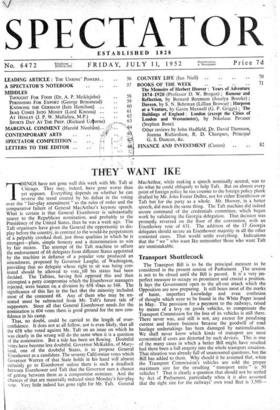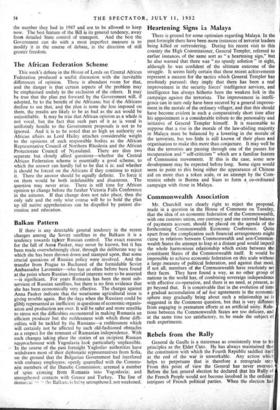Transport Shuttlecock
The Transport Bill is to be the principal measure to be considered in the present session of Parliament. The session is not to be closed until the Bill is passed. It is a very im- perfect measure to occupy so prominent and crucial a position. It lays the Government open to the all-out attack which the Opposition are now preparing. It still bears most of the marks of haste, imperfect knowledge and even confusion of thought which were to 'be found in the White Paper issued in May., The provision for a payment to the railways, raised by means of a levy on goods vehicles, to compensate the Transport Commission for the loss of its vehicles is still there. There never was, and still is not, any excuse for penalising current and future business because the goodwill of road haulage undertakings has been damaged by nationalisation. We shall never know which kinds of transport are most economical if costs are distorted by such devices. This is one of the many cases in which a better Bill might, have resulted had there been a full enquiry into the whole transport situation. That situation was already full of unanswered questions, but the Bill has added to them. Why should it be assumed that, when the Transport Commission's vehicles are sold the proper maximum size for the resulting " transport units " is 50 vehicles ? That is clearly a question that should not be settled by Act of Parliament, particularly when it is also assumed that the right size for the railways' own road fleet is 3,500— the number they had in 1947 and are to be allowed to keep now. The best feature of the Bill is its general tendency, away from detailed State control of transport. And the best the Government can do with a most imperfect measure is to modify it in the course of debate, in the direction of still greater freedom.








































 Previous page
Previous page